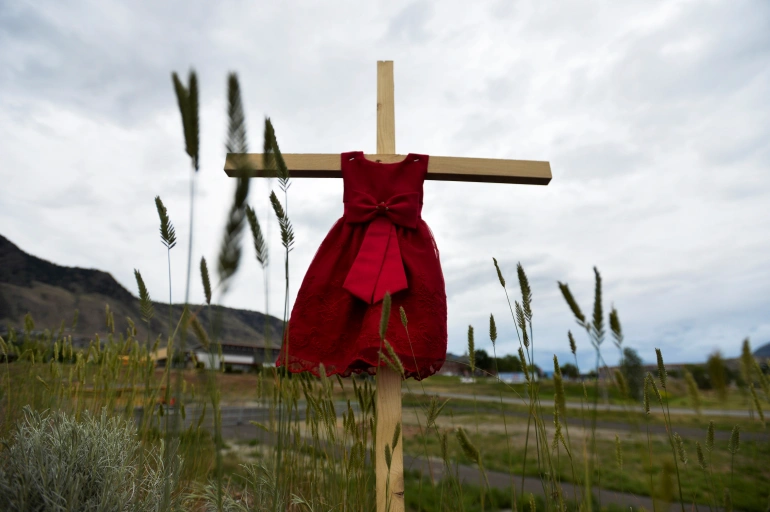
A child's red dress hangs on a stake near grounds where unmarked graves were found [File: Jennifer Gauthier/Reuters]
Vancouver, January 26 (RHC)-- An Indigenous community in Canada’s western province of British Columbia has found dozens of potential unmarked graves on the grounds of a former residential school, the latest such discovery over the past year.
Williams Lake First Nation has announced that preliminary results of the first phase of a geophysical search at St Joseph Mission Residential School uncovered 93 “reflections” – believed to be unmarked gravesites. “Ninety-three is our number,” Chief Willie Sellars told reporters.
Hundreds of unmarked graves have been discovered at former residential school sites across Canada since May, when Tk’emlups te Secwepemc First Nation announced it had uncovered 215 unmarked graves at the former Kamloops Indian Residential School.
That discovery fuelled widespread calls for justice and accountability for the victims and survivors of the forced-assimilation institutions, as well as demands that the Canadian government release all records pertaining to the facilities.
Canada forced more than 150,000 First Nations, Inuit, and Metis children to attend residential schools between the late 1800s and 1990s. The children were stripped of their languages and culture, separated from siblings, and subjected to psychological, physical and sexual abuse. Thousands are believed to have died while attending the institutions, which were run by various churches, most notably the Roman Catholic Church.
A federal commission of inquiry into the institutions, known as the Truth and Reconciliation Commission (TRC), concluded in 2015 that Canada’s residential school system amounted to “cultural genocide.” Thousands of children from Williams Lake First Nation, as well as other Indigenous communities, were forced to attend St Joseph, which operated as a residential school from 1891 to 1981.
“In February 1902, three children ran away from the school resulting in the death of one child from exposure and exhaustion. An inquiry into the death revealed allegations of physical abuse and poor conditions at the school, including students receiving excessive punishment and being forced to eat rotten food,” the TRC wrote in a 2004 report (PDF) about conditions at the institution.
Williams Lake First Nation launched its investigation into St Joseph Mission Residential School after Tk’emlups te Secwepemc First Nation’s announcement in May. Investigators used a range of geophysical techniques in their search, including ground-penetrating radar, said Whitney Spearing, who led the community’s probe of the site. Spearing said 14 out of approximately 470 hectares (1161 acres) have been searched so far.
“To date, 93 reflections have been recorded at the St Joseph’s Mission. All of them display varying characteristics indicative of potential human burials,” Spearing told reporters, adding that investigators believe 50 of the potential burial sites are not associated with a historic cemetery on the school grounds.
Earlier this month, the Canadian federal government announced $1.5 million (1.9 million Canadian dollars) in funding for the 2021-2022 fiscal year to help Williams Lake First Nation investigate potential burial sites linked to the former residential school.
“Additionally, work will begin to support bringing Elders and Survivors together to conduct interviews and share knowledge on unmarked graves, and to gather, plan and host cultural ceremonies within their community. This community-led process will ensure that Williams Lake First Nation can undertake this work in their own way and at their own pace,” Crown-Indigenous Relations and Northern Affairs Canada, a federal ministry, said in a statement.
Last month, Ottawa also said it would release thousands of previously undisclosed records related to the residential school system.
On January 20, the government said it had reached an agreement with the National Centre for Truth and Reconciliation (NCTR), a research centre that operates out of the University of Manitoba in central Canada, “that outlines how and when Canada will share historical documents” related to the institutions.

